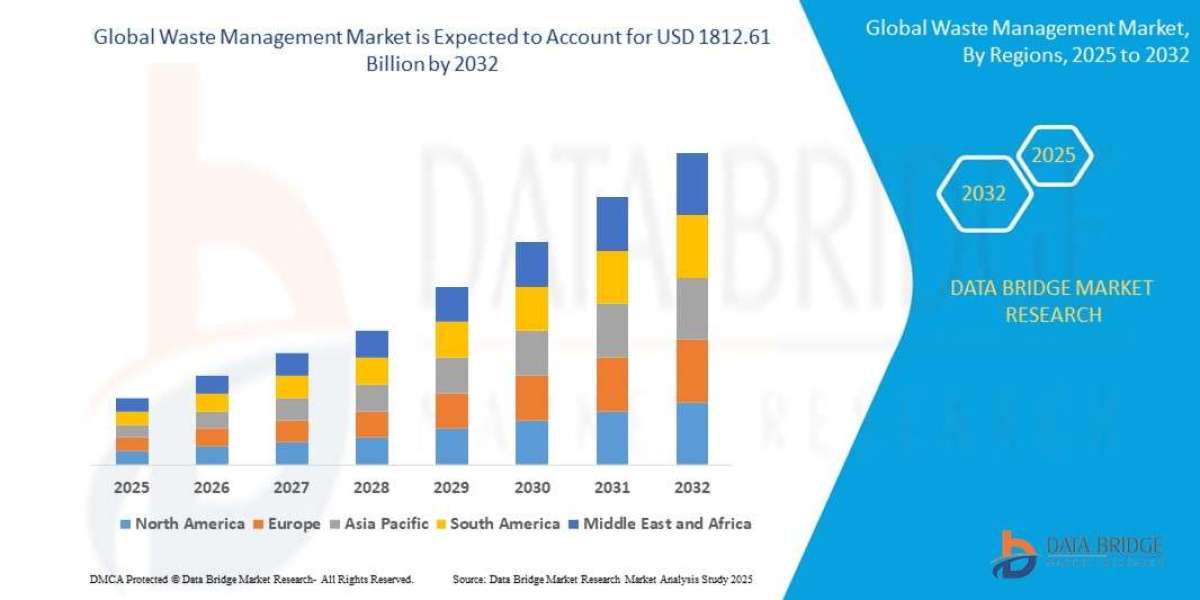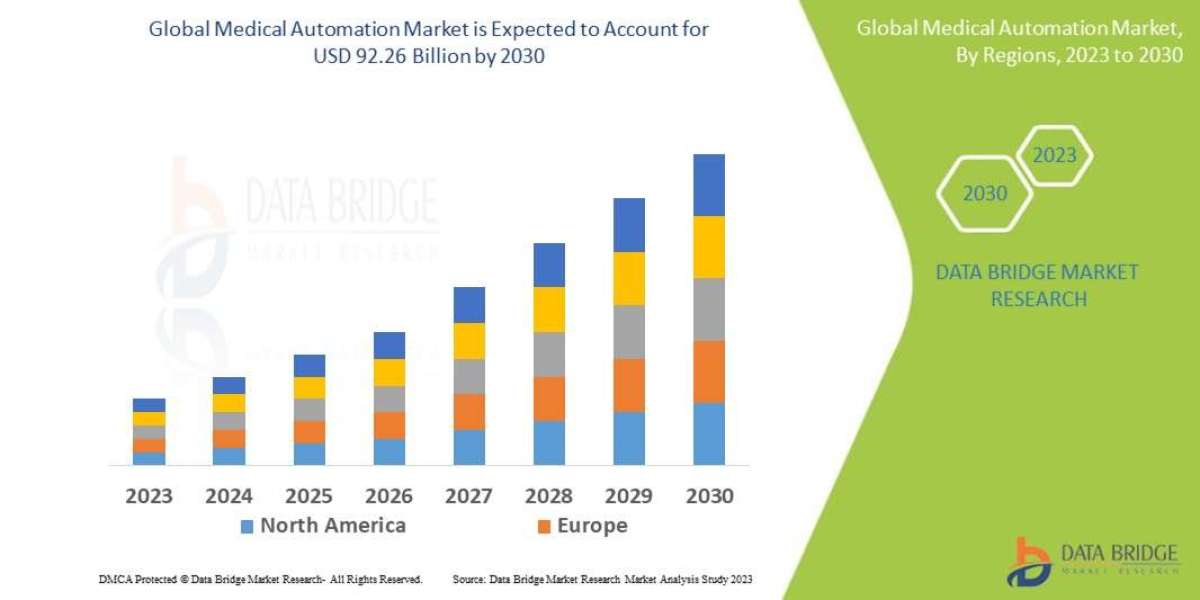"Executive Summary Waste Management Market: Share, Size & Strategic Insights
CAGR Value :
- The global waste management market was valued at USD 1163.33 billion in 2024 and is expected to reach USD 1812.61 billion by 2032
- During the forecast period of 2025 to 2032 the market is likely to grow at a CAGR of 5.70%,
Waste Management Market report is structured with the best and advanced tools of collecting, recording, estimating and analysing market data. The insights made available in this market report are based upon SWOT analysis on which businesses can rely confidently. The report provides steadfast knowledge and information of transforming market landscape, what already exists in the market, future trends or what the market expects, the competitive environment, and strategies to plan to surpass the competitors. Waste Management Market report helps characterize commerce strategies to the businesses of small, medium as well as large size.
Several company profiles included in the reliable Waste Management Market report can be pretty useful for making any decision associated with revenue, import, export and consumption. The market report guides to get idea about the types of consumers, their reaction and views about particular products, and their thoughts for the improvement of a product. The most suitable method for the distribution of certain products can also be analysed with this market research study. When a business struggles to gain competitive advantage in this swiftly transforming marketplace, then plumping for such Waste Management Market research report is greatly recommended as it offers a lot of benefits for a thriving business.
Equip yourself with actionable insights and trends from our complete Waste Management Market analysis. Download now:
https://www.databridgemarketresearch.com/reports/global-waste-management-market
Waste Management Industry Statistics Overview
**Segments**
- Based on type, the global waste management market can be segmented into industrial waste, municipal waste, and hazardous waste. Industrial waste management involves the proper disposal and treatment of waste generated by industries to minimize environmental impact. Municipal waste management focuses on the collection, transportation, and disposal of waste from residential and commercial areas. Hazardous waste management deals with the safe handling and disposal of materials that pose a threat to human health and the environment. These segments play a crucial role in ensuring proper waste management practices across different sectors.
- Geographically, the global waste management market is segmented into North America, Europe, Asia Pacific, Latin America, and Middle East & Africa. North America and Europe are leading regions in waste management due to strict regulations, advanced technologies, and increasing awareness about sustainability. The Asia Pacific region is witnessing rapid growth in waste management activities as a result of urbanization, industrialization, and government initiatives to address environmental concerns. Latin America and Middle East & Africa are also emerging markets as they focus on improving waste management infrastructure and implementing sustainable practices.
- By service, the waste management market can be categorized into collection services, disposal services, recycling services, and energy recovery services. Collection services involve the gathering of waste from various sources such as households, businesses, and industries. Disposal services include landfilling, incineration, and composting to eliminate waste in an environmentally friendly manner. Recycling services focus on processing recyclable materials to create new products and reduce waste generation. Energy recovery services aim to extract energy from waste through processes like anaerobic digestion and waste-to-energy technologies.
**Market Players**
- Some of the key players in the global waste management market include Waste Management Inc., Suez Environment S.A., Veolia Environment, Clean Harbors Inc., Republic Services Inc., Stericycle Inc., Advanced Disposal Services Inc., Covanta Holding Corporation, Waste Connections Inc., and Remondis SE & Co. KG. These companies offer a wide range of waste management solutions such as collection, recycling, treatment, and disposal services to meet the diverse needs of their customers. They invest in research and development to innovate new technologies for sustainable waste management practices and comply with stringent regulations.
- Additionally, emerging players like Hitachi Zosen Corporation, Biffa Group, FCC Environment, Renewi PLC, and Progressive Waste Solutions Ltd. are making significant contributions to the global waste management market by introducing innovative solutions and expanding their service offerings. Collaborations and partnerships among market players are common strategies to enhance operational efficiency, improve service quality, and broaden market presence. Overall, the competitive landscape of the waste management market is dynamic, with companies focusing on sustainability, digitalization, and customer-centric approaches to stay ahead in the industry.
The global waste management market is experiencing significant growth driven by rising environmental concerns, stringent regulations, and increasing awareness about sustainable practices. One of the key emerging trends in the market is the shift towards circular economy principles, which emphasize reducing waste generation, promoting recycling and reuse, and maximizing resource efficiency. This transition is driving innovation in waste management technologies and services, leading to the development of advanced solutions for waste collection, treatment, and disposal. Companies in the market are investing in research and development to enhance their capabilities in areas such as material recovery, energy conversion, and waste-to-product technologies.
Another important trend shaping the waste management market is the increasing focus on digitization and data-driven decision-making. Technologies such as IoT sensors, AI analytics, and cloud computing are being leveraged to optimize waste collection routes, monitor waste composition, and improve operational efficiencies. Data-driven insights are enabling companies to better understand waste generation patterns, identify opportunities for recycling and recovery, and minimize environmental impacts. The integration of digital solutions is reshaping the waste management sector, making processes more efficient, transparent, and responsive to customer needs.
Moreover, sustainable waste management practices are gaining traction across industries, driving demand for eco-friendly solutions and services. Companies are adopting eco-friendly packaging materials, implementing waste segregation programs, and exploring innovative approaches to reduce landfill waste and greenhouse gas emissions. Circular economy initiatives, such as extended producer responsibility programs and product stewardship agreements, are encouraging manufacturers to design products for recyclability and implement take-back schemes to close the loop on material flows. Sustainable waste management is not only a regulatory requirement but also a strategic imperative for organizations looking to enhance their reputation, reduce costs, and mitigate environmental risks.
Furthermore, the waste management market is witnessing a surge in public-private partnerships and collaborations aimed at sharing expertise, resources, and best practices to address complex waste management challenges. Governments, industry associations, and non-profit organizations are working together to develop integrated waste management systems, promote sustainable practices, and raise public awareness about waste reduction and recycling. Collaborative initiatives are crucial for driving innovation, scaling up solutions, and achieving broader environmental objectives such as carbon neutrality and zero waste targets.
In conclusion, the global waste management market is undergoing rapid transformation driven by evolving consumer preferences, regulatory requirements, and technological advancements. Companies in the market are adapting to these changes by investing in sustainable practices, digital solutions, and collaborative partnerships to deliver value-added services and address the growing demand for efficient waste management solutions. As the market continues to evolve, opportunities for growth and innovation are expected to emerge, creating a dynamic landscape for waste management players to capitalize on emerging trends and market developments.The global waste management market is strategically positioned for significant expansion and evolution in the coming years due to several key factors influencing the industry landscape. One notable trend that is shaping the market is the increasing emphasis on sustainable practices and eco-friendly solutions. As environmental concerns continue to gain traction worldwide, businesses and governments are feeling the pressure to adopt sustainable waste management strategies to minimize their ecological footprint and comply with stringent regulations. This shift towards sustainability is driving the development of innovative technologies and services in the waste management sector, creating opportunities for market players to differentiate themselves by offering environmentally conscious solutions.
Moreover, the rising adoption of circular economy principles is revolutionizing the way waste is managed and resources are utilized. The circular economy framework promotes the concept of reducing waste generation, maximizing resource efficiency, and promoting recycling and reuse practices. This paradigm shift is pushing companies in the waste management market to rethink traditional linear models of waste disposal and embrace more circular and sustainable approaches. By focusing on material recovery, energy conversion, and waste-to-product technologies, market players can tap into the growing demand for solutions that align with circular economy principles and contribute to a more sustainable future.
Additionally, the integration of digital technologies and data-driven decision-making is reshaping the waste management industry, driving operational efficiencies and enhancing customer experiences. The adoption of IoT sensors, AI analytics, and cloud computing platforms is enabling waste management companies to optimize collection routes, monitor waste composition, and streamline operational processes. Data-driven insights are empowering businesses to make informed decisions, improve service quality, and respond more effectively to dynamic market demands. The digital transformation of the waste management sector not only enhances operational performance but also opens up new possibilities for innovation and value creation in a technology-driven market environment.
Furthermore, the growing trend of public-private partnerships and collaborations is fostering a spirit of cooperation and knowledge sharing within the waste management industry. By joining forces with government agencies, industry associations, and non-profit organizations, companies in the market can leverage collective expertise, resources, and best practices to address complex waste management challenges more effectively. Collaborative initiatives play a crucial role in accelerating innovation, scaling up sustainable solutions, and driving positive change towards achieving overarching environmental goals such as carbon neutrality and zero waste targets. By working together, stakeholders in the waste management ecosystem can unlock synergies, drive systemic change, and create lasting impact in the pursuit of a more sustainable and circular waste management paradigm.
In conclusion, the global waste management market is evolving rapidly in response to changing consumer behaviors, regulatory pressures, and technological advancements. Companies operating in the market have a unique opportunity to capitalize on emerging trends such as sustainability, circular economy principles, digital transformation, and collaborative partnerships to differentiate their offerings, expand their market presence, and drive innovation in the waste management sector. By embracing these trends and staying at the forefront of industry developments, waste management players can position themselves for long-term success and make a meaningful contribution to a more sustainable and resource-efficient future.
Understand how much market the company controls
https://www.databridgemarketresearch.com/reports/global-waste-management-market/companies
Alternative Market Research Questions for Waste Management Sector Reports
- How is blockchain being integrated in supply chains?
- What B2B platforms are most popular in this Waste Management Market?
- Which regions face regulatory restrictions?
- What portion of market growth is organic vs. inorganic?
- What predictive analytics tools are used?
- What is the average lead time for fulfillment?
- How is the Waste Management Market affected by geopolitical tensions?
- What innovations are improving packaging?
- Which firms are leveraging SaaS tools in operations?
- How are customer retention strategies evolving?
- What are the pain points in after-sales service?
- What are the trends in mobile-first commerce?
- Which areas show declining Waste Management Market interest?
- What AI tools are optimizing consumer targeting for Waste Management Market?
Browse More Reports:
Global Algae Fertilizers Market
Global Construction Film Market
Global Antimicrobial Agent Market
Global Benchtop Laboratory Water Purifier Market
Asia-Pacific Feed Flavours and Sweeteners Market
Global Catenary Infrastructure Market
Global Bus Public Transport Market
Latin America Point of Care Infectious Disease Market
Global Innovation Management Market
Middle East and Africa Indium Market
Global Antibiotics Market
Global Potassium Humate Biostimulants Market
Africa MDI, TDI, Polyurethane Market
Global Dental Diode Lasers Market
Middle East and Africa Artificial Turf Market
Global Hematologic Malignancies Market
Latin America Ostomy Devices Market
Asia-Pacific Rotomolding Market
Philippines Microgrid Market
Global Automated Beverage Carton Packaging Machinery Market
Global Surgical Power Tools Market
Europe Intensive Care Unit (ICU) Ventilators Market
Global Vasodilators Market
Global Methylene Diphenyl Diisocyanate (MDI), Toluene Diisocyanate (TDI) and Polyurethane Market
Global Constrictive Pericarditis Market
Middle East and Africa q-PCR Reagents Market
Global Artificial Turf Market
Global Styrene Butadiene Latex Market
Global Digital Farming Software Market
Global Alpha Linolenic Acid Market
Global Head and Neck Cancer Drug Market
North America Swabs Collection Kits Market
About Data Bridge Market Research:
An absolute way to forecast what the future holds is to comprehend the trend today!
Data Bridge Market Research set forth itself as an unconventional and neoteric market research and consulting firm with an unparalleled level of resilience and integrated approaches. We are determined to unearth the best market opportunities and foster efficient information for your business to thrive in the market. Data Bridge endeavors to provide appropriate solutions to the complex business challenges and initiates an effortless decision-making process. Data Bridge is an aftermath of sheer wisdom and experience which was formulated and framed in the year 2015 in Pune.
Contact Us:
Data Bridge Market Research
US: +1 614 591 3140
UK: +44 845 154 9652
APAC : +653 1251 975
Email:- [email protected]
"








